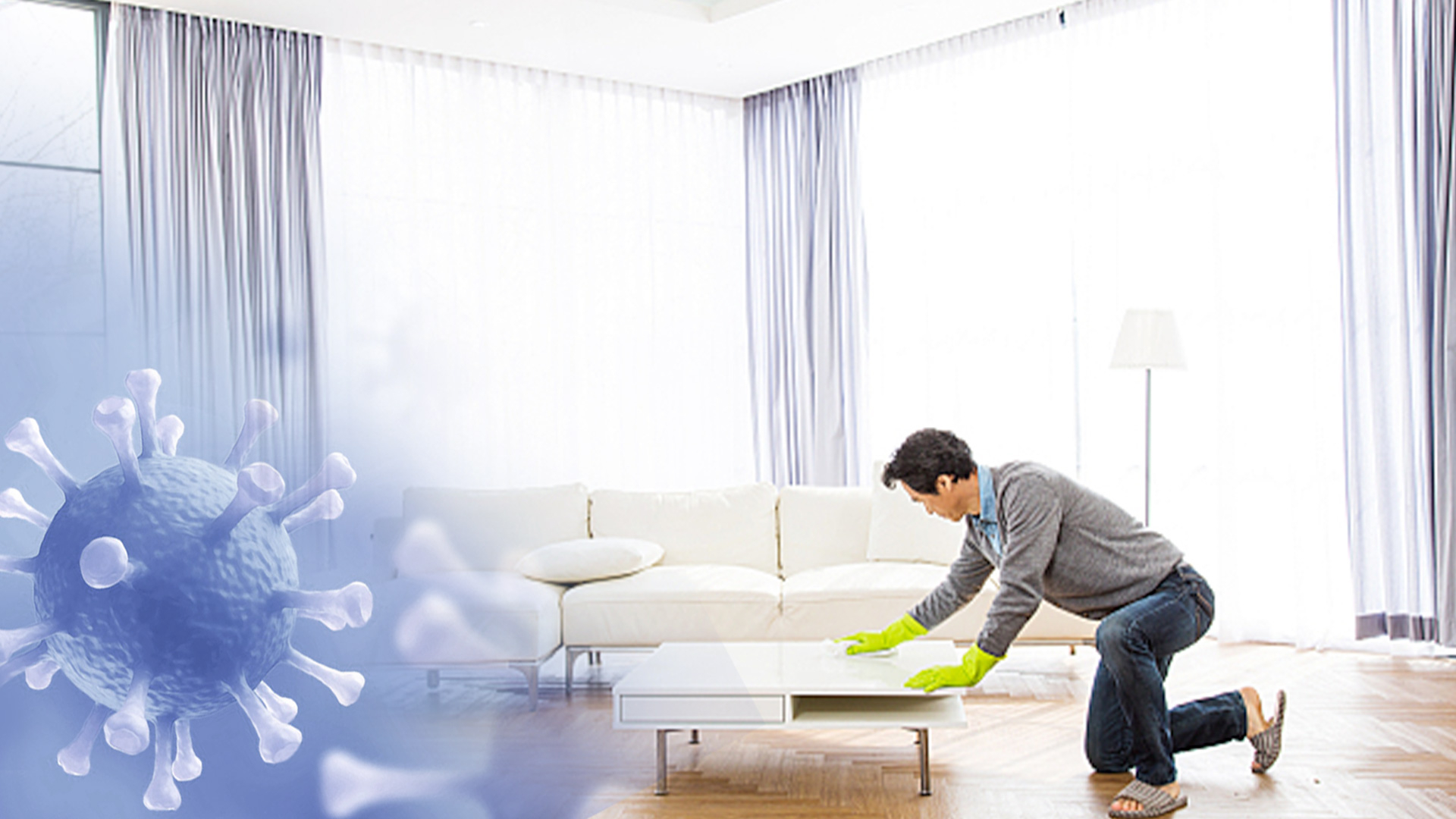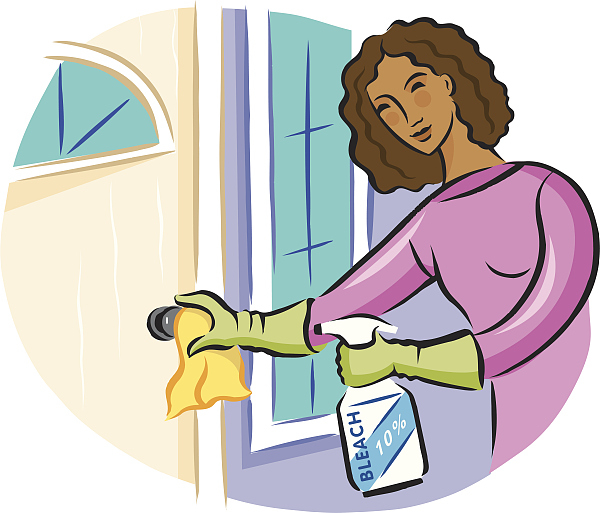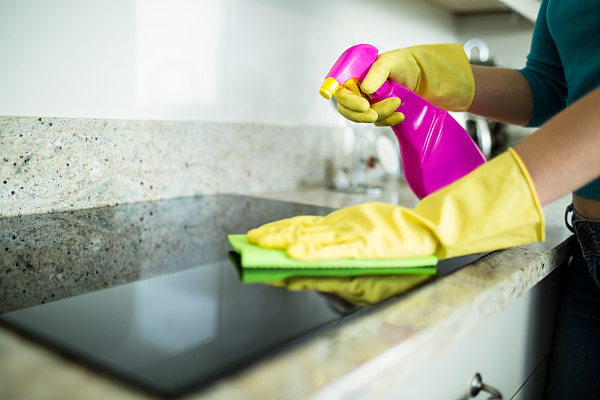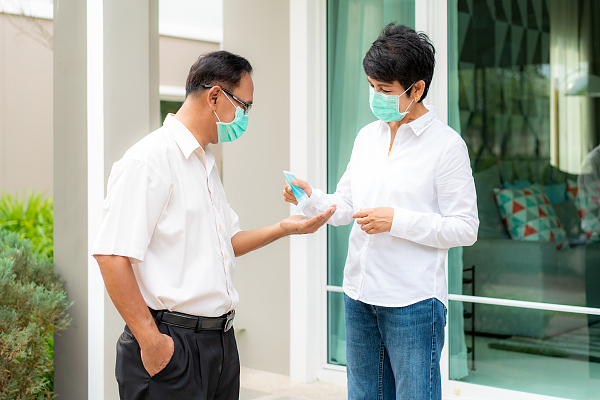
Cleaning and disinfection of the living environment are necessary during the COVID-19 outbreak. So how can you disinfect your home?
General advice
For those staying at home alone, they only need to clean surfaces of household items on a daily basis and maintain hygiene in the household environment. It's not necessary to carry out disinfection.
But after visits by family members (with unknown physical health conditions) or returning from an environment with a high risk of infection, it's recommended that the timely disinfection of surfaces of related household items be conducted.
How to disinfect household items
First, you should make sure that the floor is clean and dry, and there are no damp corners to help prevent the breeding of viruses and bacteria.
Chlorine-containing disinfectant fluid at a concentration of 250 mg/L can be prepared to wipe surfaces of floor, desk tops and other objects. The sanitizer may include 84 disinfectant fluid, bleaching powder, or other chlorine-containing disinfectant powder/tablets and peroxides.

Surfaces of metals, electric appliances and other objects not resistant to corrosion (such as cell phones and computers) can be wiped by a 75 percent alcohol prep pad or a disinfecting wipe for not less than 15 minutes, and then wiped using clean water to remove residual disinfectant.
Although it remains unclear whether the new coronavirus can be transmitted through the digestive system, attention should be paid to separate dining on safety grounds.
Mugs and cutlery can be disinfected by putting in boiling water or steam for 15 minutes after washing or disinfected pursuant to instructions for use. Sanitary ware can be wiped with chlorine-containing disinfectant fluid that has a chlorine concentration of 500 mg/L, and, after 30 minutes, wiped using clean water.
Clothes, bedding and other daily necessities can be cleaned as usual. They can be left to dry outside since the coronavirus is unlikely to survive in the air without a living cell (like the human body). Besides, given the outdoor air circulation, viruses wouldn't accumulate on bedding and clothes during the drying process.
Floors and walls of bathrooms can be mopped and wiped by chlorine-containing disinfectant fluid at a concentration of 500 mg/L.
Basins and toilet bowls shall be cleaned on a daily basis. The proper amount of disinfectant fluid can be sprayed on surfaces for disinfection, and plenty of tap water should be used for rinsing after disinfection, otherwise the pipeline network will be corroded. Loose floor drains or damaged sewer lines should be replaced.
Mops, rags and other cleaning tools are a blind zone of disinfection. Soak them in chlorine-containing disinfectant with effective chlorine concentration of 500 mg/L for 30 minutes, then wash them and let them air-dry.

How to prepare disinfectant
Taking alcohol as an example, the optimum concentration is between 75% and 85%. Attention shall be paid to ventilation to avoid a fire hazard, and the liquid should not be applied to the mucous membrane to avoid irritation.
The commonly used chlorine-containing disinfectant is 84 disinfectant, and disinfectant with a chlorine concentration of 500 mg/L can be acquired by adding 10 mL disinfectant into 990 mL water. If you need to wipe surfaces of objects, it can be further diluted with an equal amount of water.
In the case of 84 disinfectant tablets, specifications shall be read carefully, and disinfectant fluid with a chlorine concentration of 500 mg/tablet can be acquired by adding 1 tablet of 500 mg/tablet or 2 tablets of 250 mg/tablet into 1,000 ml of water.
It shall be noticed that 84 disinfectant can easily react with other chemicals and generate toxic byproducts, so don't mix it with acidic and alkaline substances (such as vinegar, toilet cleaner and baking soda) or prepare with hot water, and disinfectant purchased should be stored away from light and heat.
Besides, since disinfectants are normally irritating, please open windows after use to allow for ventilation. Senior citizens, infants and people with respiratory diseases should be asked to stay in their rooms temporarily instead of the room being disinfected. Disinfection works should be conducted room by room.
Don't forget air disinfection
Respiratory droplet transmission is a major route of transmission, so air disinfection or ventilation shall be conducted as well.
Natural ventilation is the first choice, so open doors and windows as much as possible for ventilation, at least two to three times for a minimum of 30 minutes each.
If you need to use air-conditioning, then its filter and filter screen shall be cleaned and disinfected on a monthly basis. Disinfectant fluid with a chlorine concentration of 250 mg/L can be used to spray them and make them moist; let it work for 30 minutes.

For people asked to self-quarantine at home
Disinfection methods for people staying at home for self-quarantine are basically the same as those for ordinary people, but the disinfection frequency is obviously higher.
Cutlery and objects frequently touched by those under quarantine should be cleaned and disinfected frequently on a daily basis. They include night tables, bedsteads and other bedroom furniture.
Surfaces of bathrooms and toilets should be cleaned and disinfected at least once on a daily basis. The buffer zone can be set at the entrance of the rooms of the quarantined.
Use ordinary laundry soap and clean water to wash clothes, bed sheets, bath towels and washcloths in close contact with quarantined people, or use a washing machine to wash them with water at 60~90℃ and regular household laundry detergent, and then let them fully air-dry.
Family members should wear masks, disposable gloves and protective clothing (such as plastic aprons) before cleaning and disinfection to avoid direct contact with clothes, bedding and the discharges of quarantined people, who shall also thoroughly wash and disinfect their hands before wearing and taking off gloves.
(Stories reviewed by Xiao Erhui from Henan Provincial People's Hospital)
Stories in this series were contributed by Tencent Medpedia medical team and were written and reviewed by medical experts from China's top hospitals. It is intended for informational purposes only and is not a substitute for professional medical advice, diagnosis or treatment. Never ignore professional medical advice in seeking treatment because of something you have read on our website. If you think you may have a medical emergency, immediately call your doctor, or go to a hospital.